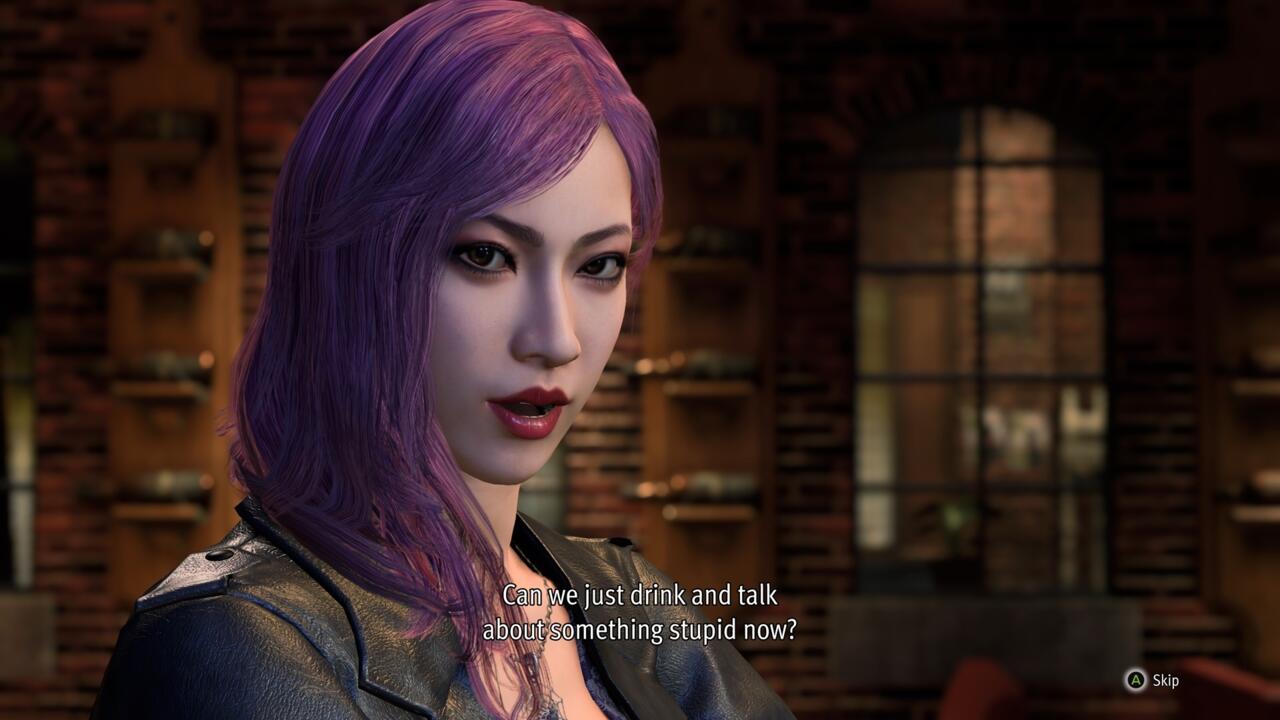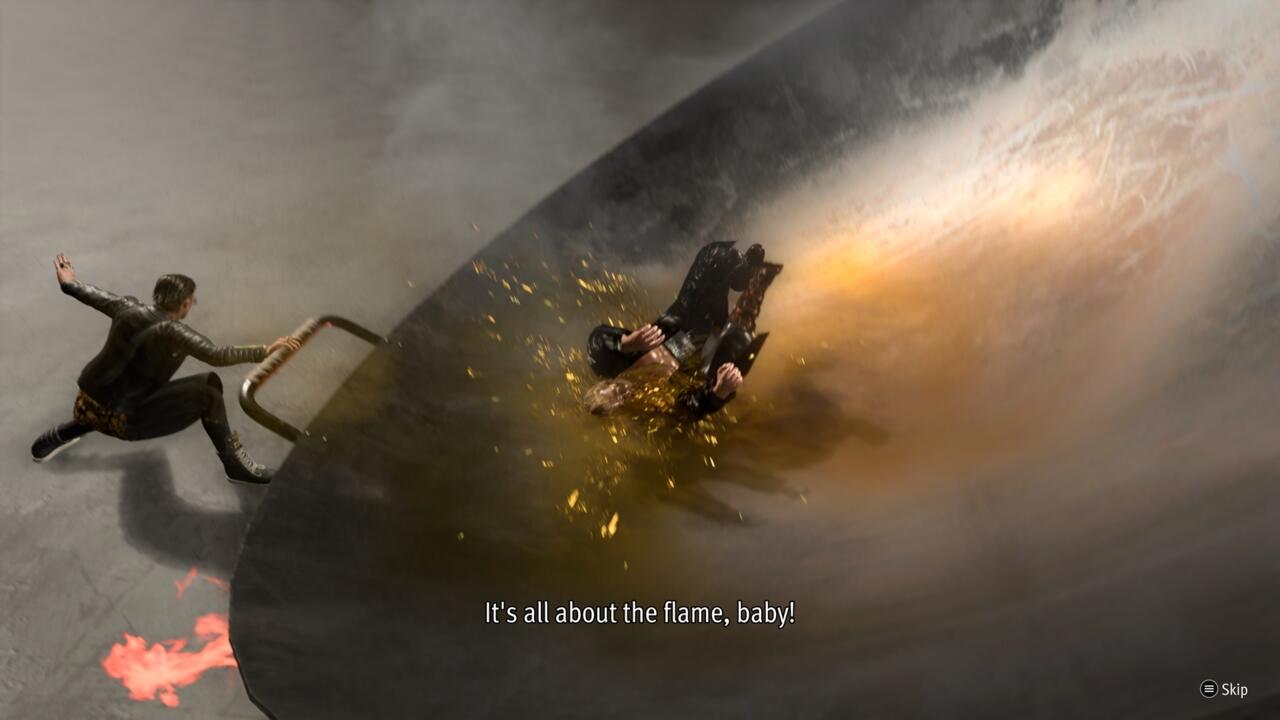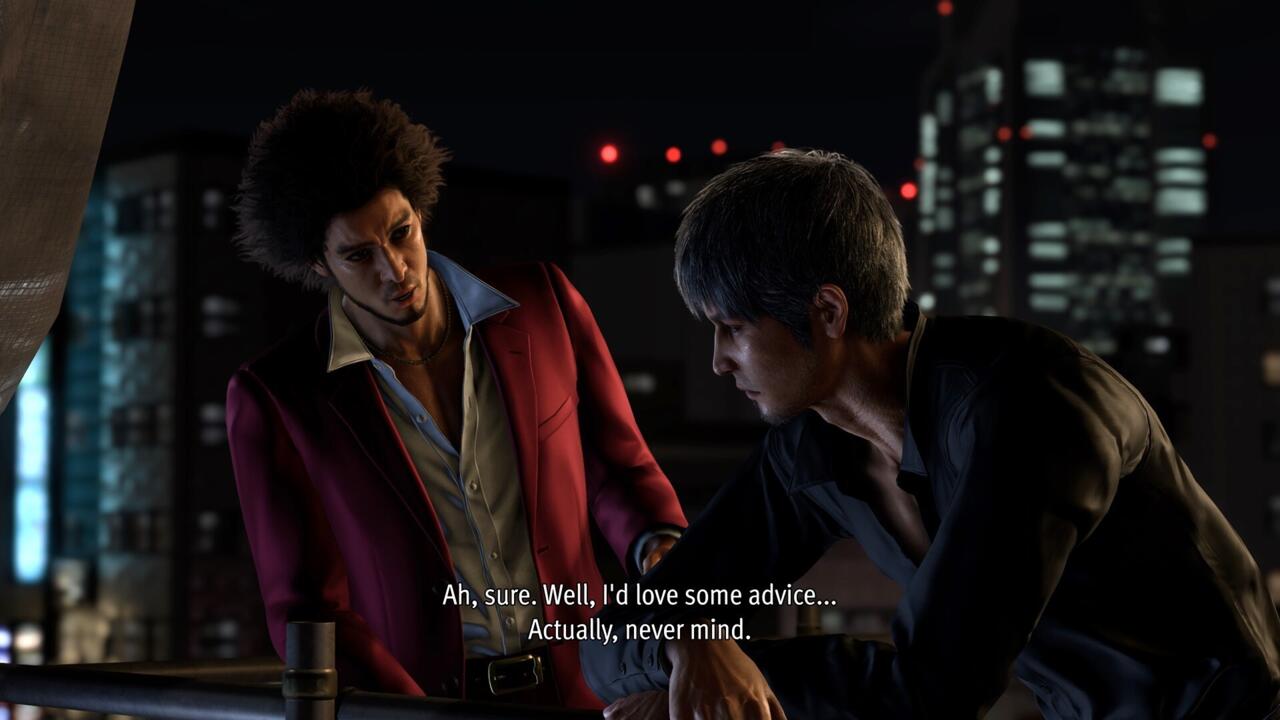On paper, Like A Dragon: Infinite Wealth has everything I could possibly ask for in a game from RGG Studio: Kasuga Ichiban from the 2020 RPG Yakuza: Like A Dragon co-leading with series legend Kazuma Kiryu--two characters I love dearly fighting alongside one of the most memorable supporting casts in recent years. It's the best of both Yakuza worlds coming together for a story about life, legacy, and the daunting realities of the world we live in--but, more than anything, atonement and the various forms it can take. It also comes with greatly improved RPG systems that nail the tactical joy of turn-based combat while upholding Yakuza's identity in remarkable ways. And in splitting its time in Hawaii with Yokohama, you get two robust and detailed locations to explore new and old ideas through the biggest suite of side activities the series has had thus far.
For all its comedic absurdity and optional diversions, Infinite Wealth brings its heavier themes into focus--at times--with the kind of dramatic storytelling the franchise has mastered over the years. It's unfortunate to say, however, that the main story loses the thread along the way. By putting unearned emphasis on its least interesting aspects and meandering for much of its runtime, the compelling narrative ambitions it sets up are largely left unfulfilled. That's tough to grapple with for what's supposed to be a monumental passing of the torch between the two beloved leads and one last hurrah for one whose life we've seen unfold across nearly two decades' worth of games. And so, instead, Infinite Wealth becomes a game about individual moments--moments of bittersweet reflection, moments of heartfelt camaraderie, and moments of hype that uplift legendary characters even higher. These are moments that remind you the Yakuza franchise is much bigger than any one game. Even when Infinite Wealth's overarching plotline comes up short in crucial ways, those moments still make it worth playing.
Things kick off with a strong opening that puts the realities of normal adult life front and center, almost as if RGG held a mirror up to my face and made a prologue chapter based on some of the things I've been through. More than just being real and relevant to the average person, this also tees up a powerful theme about the struggles of reintegrating with society after a life of crime, which has frequently been explored in the series from different perspectives. In Infinite Wealth, the theme is used to show Ichiban's struggles, as someone who embodies everything good about being the naive goofball with fists of iron and a heart of gold, and as a person driven by the ideals established in his previous game. Furthermore, the recurring theme of public opinion and internet virality dictating reality sharply foreshadows how Infinite Wealth steeps itself in modern social commentary.
As much as Ichiban makes peace with his past, it comes back around and propels him to visit Hawaii in search of family, making for a nice getaway but also a new place to get caught in another complex web of powerful criminals and conspiracies. The streets of Honolulu have been recreated with the same level of detail as Kamurocho, Ijincho, Sotenbori, or any other location from the series. As someone who's spent time in the exact locations modeled in Infinite Wealth, it's wild how familiar it all felt, from the beautiful Waikiki shoreline where the Duke Kahanamoku statue stands, to the backstreets around Ala Wai I walked after late nights out, it's all brought to life with attention to detail. ABC Stores are around every corner, the Ala Moana mall and other shopping centers have a striking resemblance here, and even the local boutique 88 Tees has a shop where you can buy gear and gifts. It's a welcome change of scenery, especially given its spacious streets are dense with side content but also perfect for busting out a segway and cruising along. It's only fitting that you get a dedicated button to make Ichiban throw up the shaka and greet passersby with a hearty "Aloha!" too.
Infinite Wealth doesn't take you to Hawaii for vacation, though--therein lies a story about an underworld that's just as insidious as anything we've seen in Kamurocho. This comes with some sharp commentary about how the rest of the US treats Hawaii, the interconnectedness of the police with the criminal underworld, and the importance of local charity holding its people together. A lot of strong groundwork gets laid in these opening chapters, but as the main story goes on, a significant amount of time gets spent on continuously laying more groundwork without taking the narrative in a meaningful direction. At certain points, Infinite Wealth instead becomes more concerned with setting up factions and relatively weak villains for the sake of giving you something to chase. By dedicating so much time and effort to plot threads that either don't amount to much or just aren't very compelling, I struggled to buy into what the entire party was fighting for most of the time. Yakuza games have been great about giving you something tangible to fight for, and even when you know a big plot twist is going to upend your efforts, at least there's a convincing momentum toward the story's bigger truths. As Infinite Wealth went on, however, I couldn't help but see the clock ticking on it being able to make good on the things that matter most and I came away with mixed feelings.

That's not to say Infinite Wealth doesn't have incredible touches along the way, because with those uncharacteristic lows come some spectacular highs. For Kiryu, there's a powerful level of introspection that shows him coming to terms with everything he's struggled with, and he reckons with the broader idea of the yakuza as an organization and bearing some responsibility for the consequences of their misdeeds. What you do with the limited time you have left becomes an ever-present theme, and every time he seeks closure for one aspect of his life, it's a bittersweet feeling for such an inspiring character. Since the main story is often focused on the bigger picture of factional drama, several of Kiryu's best moments are relegated to side content. At times, I wrestled with the idea that the most important parts of his life were seen as an afterthought, especially once I saw how Infinite Wealth somewhat undermines what Like A Dragon Gaiden set up for him. But at least he gets a big stage at critical points. And if you've been with the series from the beginning, Infinite Wealth provides one of the series' highest peaks by blending the franchise's history into an unforgettable gameplay sequence.
While Ichiban also gets some great moments showcasing his unbreakable faith in the people around him, I can't help but come away annoyed with what this game does with his character overall. Sure, he still has a lot of growing up to do in the aftermath of the previous game, but he's so often used as a tool for shallow jokes and has a serious problem with who he directs his empathy towards, so it feels like he's noticeably regressed. Considering how the opening chapters reinforce the qualities that made him a lovable character, it's disappointing that we only see short glimpses of brilliance throughout the rest of the story.
Even still, this is a series that has proven character development is its greatest strength, which comes through in most of the supporting cast. That's particularly true of newcomer Tomizawa, whose arc of humble and dubious beginnings is fleshed out, allowing him to grow in believable and human ways, eventually fitting into the existing band of misfits. Chitose adds a youthful perspective and an important lens into the modern world to contrast with the older folks who are always just seemingly down on their luck. Everyone from Yakuza: Like A Dragon returns in some form, and while they often feel sidelined in the main story, the times they do band together are heartwarming. So much of that charm comes through in Drink Links, optional conversations that open up as you increase your bond level with party members. Through either Kiryu or Ichiban, you get well-written heart-to-hearts that add a layer of nuance to each character, reminding you that sometimes talking through your troubles and asking for help can unexpectedly change your life for the better. It's a bit odd that some seemingly crucial developments happen through this portion of side content, but they're worth working toward regardless.

Having all these lovable characters in a party genuinely makes the RPG combat all the more enjoyable, as their personalities shine through in their default Jobs and movesets. Whether I'm fighting a massive shark off the side of a boat or an in-game Danny Trejo who's dual-wielding machetes, the turn-based combat puts the spotlight on each of the party members and their distinct personality, letting combat also drive the story and enhance their characterization. As ridiculous as it is to scrub down enemies in a bubble bath or pop bottles of champagne to do water-based damage, for example, it's also an effortless blend of the series' unmistakable sense of humor and the intensity of dramatic high-stakes battles. Furthermore, the expanded Job system lets each character take on different roles with some utterly ridiculous attacks and spells, like the surfer-inspired Aquanaut, the deadly ninja Kunoichi, or the gunslinging Desperado. You can find borderline broken team compositions with super-effective movesets, but rather than feeling like exploits, it's rewarding in the sense that it comes from a better understanding of the systems at play, which are noticeably deeper than those of the previous entry.
Mechanically speaking, a number of smaller changes lead to significant improvements in combat. Being able to move around a defined space during each turn lets you line up back attacks, area-of-effect spells, and knockbacks, which add a new strategic layer to the system. Bond levels and Drink Links are also integrated into progression to open up perks like slick combo attacks, freebie follow-ups, and tag-team attacks, and it's a wonderful embodiment of the power of friendship wrapped into tangible gameplay perks. It's not the most elegant system, since positioning can be imprecise and context-sensitive actions can obstruct the actual attack you want to execute. But the tradeoff is that you're in much more control of the party, and the tactical considerations that come along with that control makes for a satisfying and unique flow. And at the end of the day, where the hell else are you going to get a turn-based RPG with grown-ass adults taking on imaginary jobs to fight their toughest foes? Even when I wasn't fully invested in the story, the battles kept me engaged. And thanks to the stellar combat system I didn't even mind the occasional dungeon grind that's soft-required to reach the appropriate level to progress in the main story.

The way Kiryu has been molded into an RPG character is brilliant as well. His three signature stances give his normal attack flexibility, and his Essence spells call back to the skills he's picked up over the years. But most of all, his Dragon's Resurgence limit break has to be one of the coolest things the series has ever done, especially as a narrative device. Despite fights being turn-based, this gives you a brief window to control Kiryu in the old action-brawler style to show he still carries that Dragon of Dojima spirit no matter what. Overall, RGG has truly found its footing in making its own outstanding RPG combat system, and one that stands among some of the best in the business.
Of course, another aspect that is essential to the spirit of a Yakuza/Like A Dragon game is the optional activities that litter the maps of Honolulu and Yokohama. Small things like background conversations you can initiate while roaming the world give a little boost to social standing with party members and add some nice flavor to them. The in-game Tinder equivalent is as outlandish as it is believable, with writing you can tell comes from people who've had experiences on dating apps. And as is tradition, substories are around every corner. The series has made its reputation on some of the wild things that happen in these side quests--for Infinite Wealth, there are a few instances of comedic gold and neat callbacks, and then there are some major flops. Sometimes it felt like RGG went over the top for the sake of it, or tried to send a poignant message but woefully fumbled the delivery. It's also really disappointing that they put Ichiban in some gravely uncomfortable situations for goofs, so in some respects, the substories have lost sight of what made them good to begin with.
The big swing Infinite Wealth takes is in Dondoko Island, the Animal Crossing-style crafting and management activity that kind of exists in its own realm. I'm hesitant to call it a minigame given how involved its mechanics are. From clearing trash in order to expand into new zones to farming materials across the island, a certain level of effort is required to start building out your resort. A worthwhile side story is also attached to advancing your ranking in Dondoko Island, and this involves fending off hostile pirates, inviting visitors to make money off of, and crafting increasingly sophisticated structures. Part of me misses the simplicity of Ichiban Confections from the previous game, where building a business and appeasing stakeholders were wrapped in a briskly paced management-sim minigame. However, I don't mind the trade-off for having more to chew on with Dondoko Island, and thankfully I had the appetite for engaging with these sorts of systems.

To bring things back down to earth, Memoirs of a Dragon are Kiryu's bucket list of side activities for him to either enjoy his life for once or reflect on the life he's led. These come in various forms, like short lines of dialogue where something in the world triggers Kiryu's memory of a specific event from a previous game or full-on substories that go deeper on reopening certain plotlines from the past. Like the rest of the series, they can range from hilarious to heart-wrenching. While knocking these out may feel formulaic, it gives a certain warmth and reverence to a character who also exhibits many regrets and recognizes the mistakes he's made in life. Kiryu's more complex than he often leads us to believe, and that side of him surfaces in moments throughout Infinite Wealth.
A microcosm of those great moments is found in karaoke. It's always been a staple of the franchise and the go-to minigame that perfectly captures Yakuza's personality. The game directly acknowledges the importance of karaoke and the role it has played throughout the series with a small but beautiful moment to complement the greatest hits songlist included in Infinite Wealth. Every character gets to jump in on the fun for catchy tunes both new and old, and there's even a spiritual successor to the classic "Baka Mitai" by Kiryu himself. It's another of those individual moments I mentioned earlier that hold things together, preventing the game from crumbling under the weight of its ambitions.

There's also the lingering thought that Yakuza: Like A Dragon had a powerful message to send and which it said with its whole chest--and that's about showing dignity and humanity to the people who live on the margins of society. Infinite Wealth starts with a promising take on that theme, then mostly drops the notion as it's more concerned about chasing mysteries and plot twists that lack the bite and emotional pull that the series has historically done so well. Going to Hawaii opens up a variety of ways to reinforce the ethos established by the previous game, but instead it too often plays on the location for gags or to create an excuse to beat on big-bad others who simply exist to be punching bags. Much like the concept of language barriers being a fascinating narrative theme, which gets dropped shortly after it's introduced, it feels like Infinite Wealth bit off more than it could chew and had to roll with undercooked execution in the end.
In my review of Yakuza: Like A Dragon from 2020, I said the future of the series was in good hands with Ichiban as the new lead, and I still believe that because there's still plenty to adore about him. For as inconsistent as Infinite Wealth is in reaching the heights of its predecessors, it delivers fragmented but unforgettable moments for those who've been on the Yakuza ride all this time. This sequel proves that RGG is a legitimate player in the RPG space with a vastly improved combat system that is so uniquely representative of the series' identity that it feels like a perfect fit, and it's used to great effect by simply spotlighting its fantastic supporting characters. As a swan song for Kiryu, I'm conflicted on how it all comes together, but it's impossible not to get emotional about the ways it lends a deserved weight to his legacy. So, I'm not going to remember this game for its villains, their motivations, or the reasons for fighting in Hawaii, but I will remember it for the wild Yakuza hijinks and the sobering messages about what we do with the time we have left.